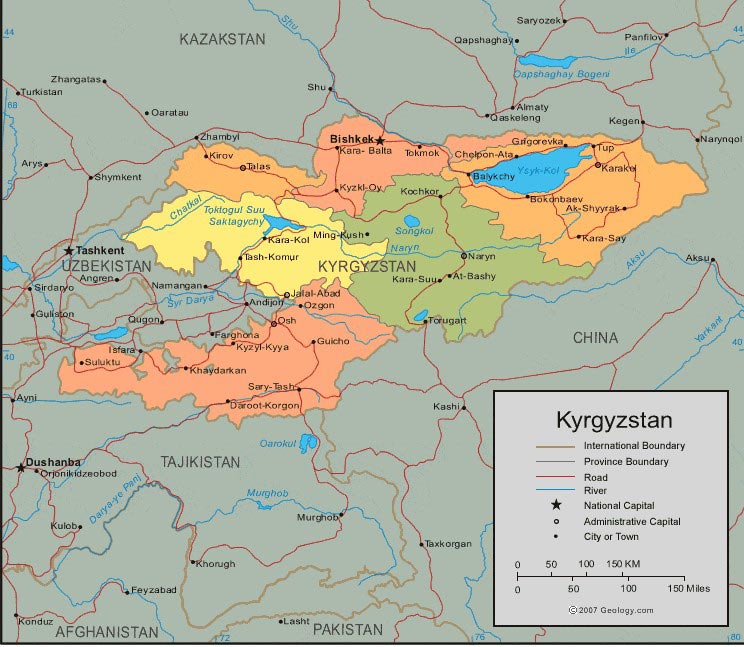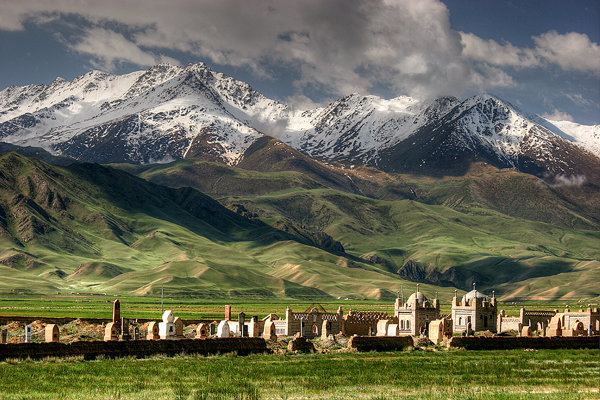Kyrgyzstan Cancels China Logistics Super-Hub Investment After At-Bashy Protests
The Kyrgyzstan Government has cancelled a US$275m Chinese investment project after a series of protests, a decision that could damage relations between the two countries just as the Covid-19 epidemic impacts on trade and investment. The logistics centre, planned for the Naryn Free Economic Zone sited at At-Bashy in central Kyrgyzstan, was to become a major stage-post in China’s Belt and Road Initiative which has turned Central Asia into a major funnel for goods heading to and from China.
Artur Baiterekov, a director of the Naryn Economic Free Trade Zone has been quoted as saying “It is not possible to work on a long-term large project in these circumstances” as other reports emerge of several protests against the project this year.
Over the past decade, China has become the driving economic force in the region, building roads, factories, hospitals and schools. This is one of the few occasions that local authorities in Central Asia have turned down Chinese investment. But resentment has been building against China’s domination in the region and Bishkek was the focus of several anti-Chinese rallies last year. In August last year at least 20 people were injured in fighting between villagers and Chinese gold mine workers in the east of the country. Many ordinary Kyrgyz complain that imported Chinese labor take most of the jobs created by their various projects. China’s reeducation camps in its Xinjiang province have also caused unease as ethnic Kazakhs and Kyrgyz have been swept up into them.
There are conflicting reports on just who pulled the plug on the project. The Kyrgyz government has said that Chinese investors lost their nerve after a series of well-supported protests in At-Bashi, while Chinese media have reported that the project was cancelled by the Kyrgyz government wanting to appease protesters.
What is for certain, though, is that Kyrgyz people power has won the day. This is a rare non-violent win for ordinary Kyrgyz. Other protests against the growing spread of Chinese influence and power in Central Asia and Kyrgyzstan have ended in violence and injury, while on this occasion the sheer size of local opposition to the project seems to have unsettled the Kyrgyz authorities and their Chinese partners.
In the local regional perspective, At-Bashi is in the heartland of Kyrgyzstan. It is a center of horsemanship and traditional Kyrgyz values. Here, surrounded by hills, lakes and mountains, people revel in their nomadic traditions far from the hustle and bustle of Bishkek. Turning this land into a logistics centre the size of 300 football pitches with major trunk roads and traffic was always going to be a hard sell. Developers apparently promised local people jobs, improved housing and modern shopping malls but none of this appealed. Kyrgyz have previously complained that all the jobs go to Chinese imported into the country as cheap labor and how the new housing stock is often of poor quality and the shopping malls empty.
But there is also more to these protests, says James Milner of the Central Asia & South Caucasus Bulletin. “China’s grip on Central Asia, its control over the region’s trade and its influence over the reader’s leaders, has started to irk ordinary people. AntiChina marches have become more commonplace, particularly in Kazakhstan and Kyrgyzstan. There people are doubly frustrated by what they regard as a betrayal by their new allies in Xinjiang, western China, where the Chinese authorities have rounded up ethnic Kazakhs and Kyrgyz, as well as Uighur, in an anti-Muslim drive. This coupled with the spread of the coronavirus, a deadly virus that Central Asians blame squarely on the Chinese, is powering anti-China sentiment.”
Going forward, the Kyrgyz authorities and their Chinese partners must do more to win over local communities and to actually provide projects that will enhance their living and wealth creation conditions without taking away the regions natural beauty and traditional way of life.
Related Reading
- China Invests in Kyrgyzstan for Central Asia Leadership
- Typical China Loan Deals To Belt & Road Countries Revealed
About Us
Silk Road Briefing is written by Dezan Shira & Associates. The firm provides strategic analysis, legal, tax and operational advisory services across Eurasia and has done since 1992. We maintain 28 offices throughout the region and assist foreign governments and MNC’s develop regional strategies in addition to foreign investment advice for investors throughout Asia. Please contact us at asia@dezshira.com or visit us at www.dezshira.com







